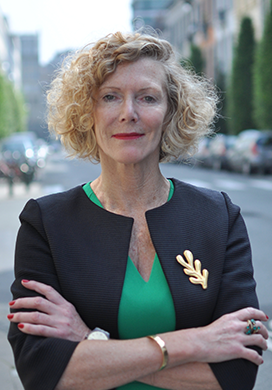At the heart of the EU project, antitrust policy is one of the toughest areas for journalists to cover. They have to make sense of the complexities of competition law for their readers and to come to grips swiftly with a variety of sectors. While not directly an actor in competition issues, Brussels media do influence how antitrust cases are perceived. Effective engagement with these journalists is therefore vital.
At Cambre’s latest #BrusselsCalling media debate, Lewis Crofts (MLex), Natalia Drozdiak (Wall Street Journal), Christian Oliver (departing Financial Times, joining POLITICO) and Alex Pigman (Agence France-Presse) spoke about the challenges of covering competition. Cambre’s director of media, Victoria Main, moderated the event, which took place at the Brussels Press Club on 9 June.
At the heart of the EU project, antitrust policy is one of the toughest areas for journalists to cover. They have to make sense of the complexities of competition law for their readers and to come to grips swiftly with a variety of sectors. While not directly an actor in competition issues, Brussels media do influence how antitrust cases are perceived. Effective engagement with these journalists is therefore vital.
At Cambre’s latest #BrusselsCalling media debate, Lewis Crofts (MLex), Natalia Drozdiak (Wall Street Journal), Christian Oliver (departing Financial Times, joining POLITICO) and Alex Pigman (Agence France-Presse) spoke about the challenges of covering competition. Cambre’s director of media, Victoria Main, moderated the event, which took place at the Brussels Press Club on 9 June.
Competition reporting is unique in Brussels
All four journalists agreed that, regardless of other changes in the EU, competition policy has remained at its core and continues to attract close media scrutiny. “Coverage of competition in Brussels is unique in terms of how it is a headline issue. There is no other place where competition is covered as intensely as here”, said Alex Pigman.
Competition reporting has changed over the years, as the European Commission has become more guarded when speaking about antitrust. As competition veteran Lewis Crofts recalled: “Ten years ago, you could go to a conference and people would say something that was news. Now it is a recount of competition policy as it stands.” He added that “now it is a hunting game instead of feeding, and the Commission is much slicker”.
Antitrust stories are therefore hard for journalist to tell, as well as difficult for readers to grasp. Context is crucial. As Natalia Drozdiak said, what the EU is doing with antitrust is not always clear to the rest of the world, so it needs to be explained. Lewis Crofts added that small competition cases can sometimes change policy or even set legal precedents, but they may not make it into the media if their significance is not clear. This is why competition journalists require input from all the relevant parties to be able to tell the full story.
Media relations matter for antitrust cases
Each of the panellists made a plea for more contact with the key players in competition cases well in advance of major developments. As Christian Oliver put it, no journalist wants to get caught out on a big competition story. Lewis Crofts agreed that “you need people to talk you through the industry”, stressing that in competition “the starting point is always silence”.
Currently, according to Natalia Drozdiak, “some companies involved don’t engage, they clam up”, thus wasting the opportunity to put their point of view and “handing the debate over to detractors”. She said they would benefit from trusting journalists more. Crofts agreed that “if you talk to the press, most of us understand the rules of engagement” and have no interest in betraying a source.
The resounding message was that if company spokespeople, lawyers and PR consultants do not take the time to brief journalists beforehand, the risk is that the Commission’s statement is all that will appear in the media on the day.
Podcast: Play in new window | Download
